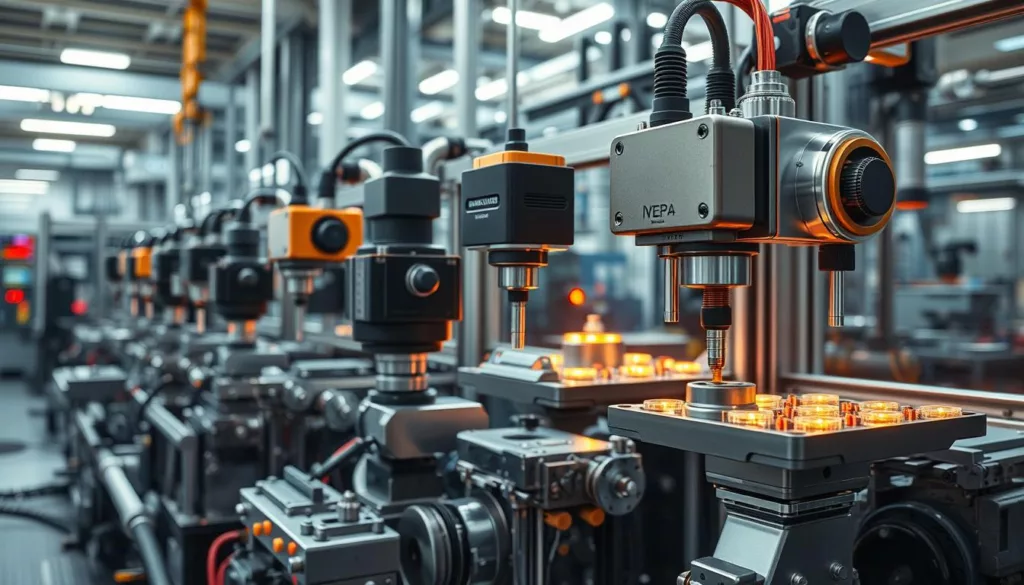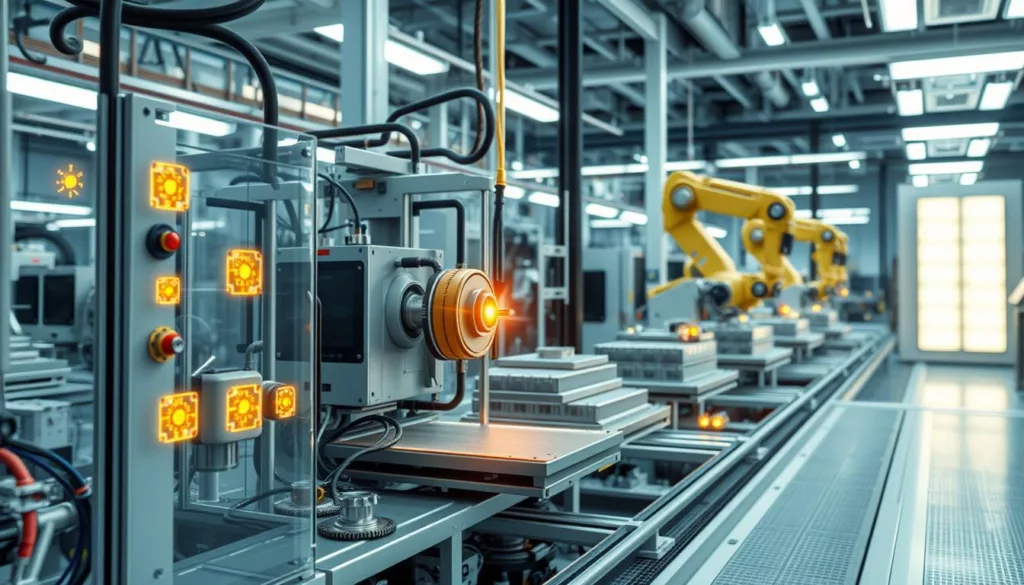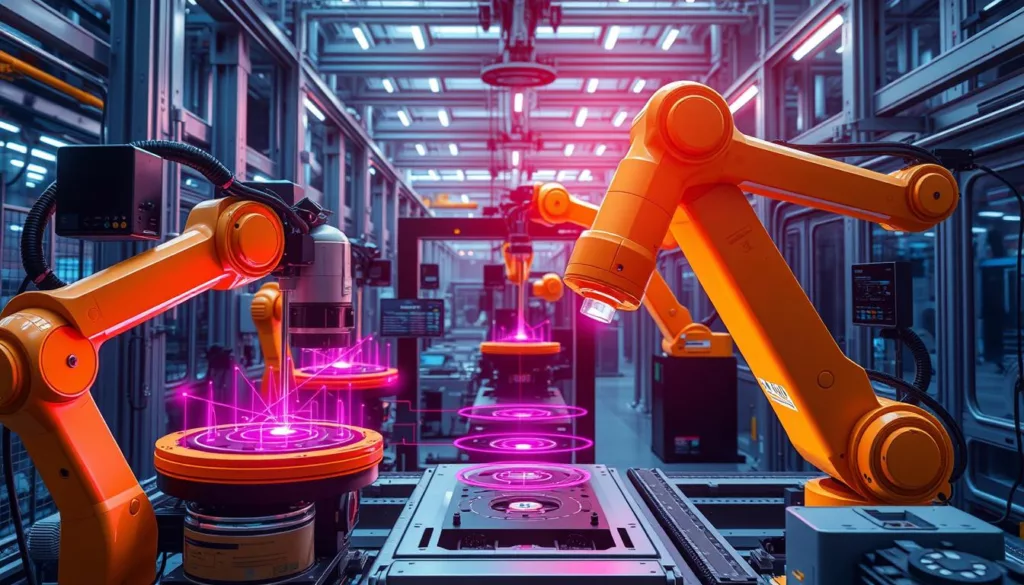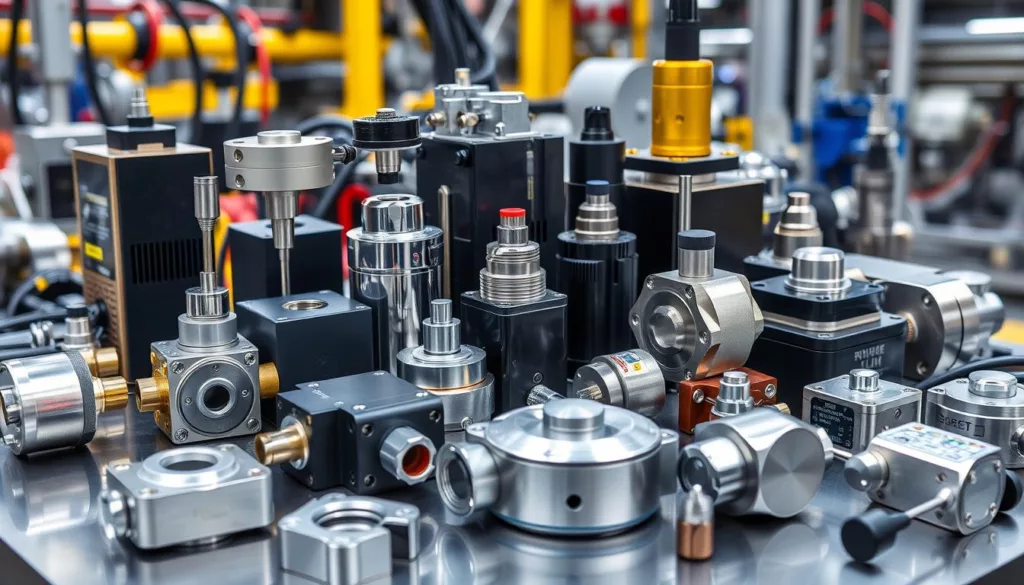How Force Sensors Improve Industrial Automation Efficiency? In today’s competitive manufacturing world, precision is key. We look at how force sensor technology boosts operational success. These sensors are vital for getting exact force readings on objects in automated settings. This leads to better control over processes and higher quality products.
They offer real-time feedback, making manufacturing more efficient and cutting down on waste. As we move towards smart manufacturing, using advanced force sensor tech is essential for leading the way.
Key Takeaways
- Force sensor technology enhances accuracy in precision manufacturing.
- Real-time feedback allows for improved process control.
- Integration of force measurement systems optimizes manufacturing efficiency.
- Reduces waste and increases product quality in industrial automation.
- Smart manufacturing trends necessitate advanced sensor integration.
Introduction to Force Sensor Technology
Force sensors are key in today’s industries. They measure the force on objects. We look at how they work, like strain gauges and load cells, which turn force into an electrical signal.
These sensors are used in many areas, like cars, planes, and medicine. They help make things better by giving accurate data. This makes production more efficient and effective.
Knowing how force sensors help is important. They lead to better ways of making things and smarter choices. Using them can give companies an edge in the market.
| Industry | Application | Benefits of Force Sensors |
|---|---|---|
| Automotive | Testing components durability | Increased accuracy |
| Aerospace | Material stress analysis | Enhanced data integrity |
| Medical | Patient monitoring systems | Real-time feedback |
Understanding Precision Manufacturing
Precision manufacturing focuses on making parts with tight tolerances and consistent accuracy. This careful method changes how we make things, using the latest technology for better results. Sensors are key in this process, helping keep everything running smoothly. They help manufacturers keep quality high.
Force sensors bring big benefits to making things. They give exact data for better automation. This move towards automation is all about being more efficient and cutting down on mistakes. With accurate force readings, making things gets faster and better.
Force sensors also help meet tough industry standards. Companies want to keep quality high and track everything. New sensor tech meets these needs, making them essential in today’s fast-paced world.
| Aspect | Description | Impact on Manufacturing |
|---|---|---|
| Precision | Tight tolerances and high repeatability | Ensures product quality and consistency |
| Automation | Integration of automated systems | Reduces labor costs and increases efficiency |
| Sensors | Role of force sensors | Enhances monitoring and quality assurance |
Applications of Force Sensors in Industry
Force sensors play a big role in many industries. They help make operations more precise and safe. By accurately measuring forces, they improve performance in various fields. Let’s look at some examples of how force sensors are used and their impact.
Force Sensor Applications Across Various Sectors
Many industries use force sensors to boost reliability and efficiency. Here are some key sectors that benefit from these technologies:
- Automotive Manufacturing: Checks the force of clamps on joins, ensuring quality in production.
- Aerospace: Tests loads on parts, improving safety and meeting strict rules.
- Food Processing: Uses sensors for weight checks, keeping product quality consistent.
- Medical Devices: Watches forces during device making, ensuring precision for critical items.
- Construction: Studies load on structures, aiding in safety checks.
Real-World Examples of Force Sensor Implementation
Many companies have seen great results from using force sensors. Here are a few examples:
| Company | Industry | Force Sensor Application |
|---|---|---|
| Ford Motor Company | Automotive | Monitors force during chassis assembly for strength. |
| Boeing | Aerospace | Checks loads on wings during tests for safety. |
| Toyota | Automotive | Controls clamp force in robot assembly for better precision. |
| Medtronic | Medical | Measures forces in making medical devices for quality. |
How Do Force Sensors Improve Industrial Automation?
Force sensors play a big role in making industrial automation better. They give real-time feedback, helping control and measure processes accurately. This not only boosts productivity but also ensures safety and quality in manufacturing.
By measuring loads and torque, force sensors help optimize equipment performance. Advanced sensors help companies:
- Work more efficiently
- Reduce downtime with predictive maintenance
- Keep operations safe by monitoring force levels
- Ensure quality with consistent measurements
Force sensor technology has improved, making them more durable and versatile. This change helps industries like aerospace and medical use automation. Choosing the right sensor is key to getting the most out of them. For more on force sensors and their benefits, see this resource.
In short, adding force sensors to automation systems boosts performance. Focusing on force measurement helps companies stay ahead in a fast-changing market.
Principles of Force Measurement
Understanding the principles of force measurement is key to precision in manufacturing. It helps engineers choose the right force sensors for automated systems. The design and technology of force sensors vary widely, impacting their effectiveness. Knowing the different types of force sensors is essential for optimizing operations.
Types of Force Sensors Used in Manufacturing
Manufacturing uses various force sensors, each for specific needs. Here are some common ones:
- Strain Gauge Sensors: Known for their high accuracy and sensitivity to small forces.
- Piezoresistive Sensors: Great for changing loads, providing strong measurement capabilities.
- Load Cells: Common in weighing, converting force into electrical signals.
- Capacitive Sensors: Ideal for non-contact measurements, perfect for delicate tasks.
Knowing these types helps manufacturers match their measurement needs with the right technology. This boosts operational efficiency.
Choosing the Right Technology for Your Needs
When picking force sensors, several factors are important for the best performance. Consider these:
- Accuracy: Check the precision needed for your application.
- Range: Make sure the sensor can handle the maximum force expected.
- Response Time: Find out how fast the sensor must react to force changes.
- Environment: Think about how temperature and humidity might affect the sensor.
By carefully evaluating these factors, manufacturers can choose the best technology for their force measurement needs. For more detailed advice on using force sensors in automated systems, check out the resources here.
Force Sensor Integration in Manufacturing Processes
Force sensors are key to making manufacturing better and more precise. As things change, using sensor technology is more important than ever. They help make sure everything runs smoothly and accurately.
Here are some important things to think about when using force sensors:
- Assessing Needs: First, figure out what you need to measure. Knowing where force sensors can help is key.
- Choosing the Right Type: Pick the right sensors, like strain gauge or piezoelectric ones. The right choice affects how well they work.
- System Compatibility: Make sure the sensors fit with your machines and software. This makes things run better.
- Calibration and Testing: After setting them up, check if they’re working right. This makes sure they’re reliable.
Companies like XJCSENSOR show how important good force sensors are. They make special sensors for different needs, focusing on being precise and efficient.
| Factor | Importance | Examples |
|---|---|---|
| Assessing Needs | Identifies key measurement points | Force measurement in assembly lines |
| Choosing the Right Type | Ensures optimal performance | Strain gauge for precise measurements |
| System Compatibility | Facilitates seamless operations | Integration with PLC systems |
| Calibration and Testing | Validates performance metrics | Routine checks for sensor accuracy |
Putting effort into force sensor integration helps manufacturers use the latest tech. It keeps them ahead in the game of making things better.
Automated Force Control in Robotic Systems
Automated force control makes robotic systems better. It uses advanced sensors and feedback to improve accuracy and speed. This leads to more efficient and safer work in many industries.
Enhancing Robotic Performance with Force Feedback
Force feedback lets robots adjust in real time. This means they can handle different loads and environments well. The main advantages are:
- Improved precision in handling delicate components
- Increased safety by avoiding excessive force that could lead to accidents
- Enhanced efficiency through optimal force application
- Greater adaptability in diverse operational situations
In summary, combining automated force control and force feedback in robotics is key. It helps companies stay ahead in precision manufacturing and other areas.
| Feature | Automated Force Control | Force Feedback in Robotics |
|---|---|---|
| Purpose | Regulate force application | Provide real-time feedback |
| Benefit | Consistency in operations | Adaptability to changes |
| Application | Sculpting and assembly tasks | Quality control checks |
| Impact on Efficiency | Reduces errors and resource wastage | Increases task success rates |
Benefits of Force Monitoring Systems
Force monitoring systems make manufacturing better and keep quality high. They give real-time feedback on force, helping catch problems early. This stops bad products from getting out.
Improving Quality Control Through Accurate Measurement
Force sensors help keep quality up by measuring forces accurately. This lets makers adjust right away, improving how things work and cutting down on bad products. It leads to happier customers and more loyalty.
Cost Efficiency and Operational Excellence
Using force monitoring systems also saves money by cutting down on waste. It keeps machines running right, reducing damage and downtime. This makes things work better and lasts longer, making force sensors key for modern making.





